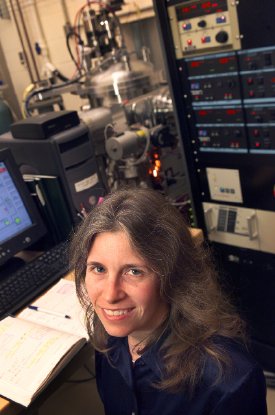Jun 14 2008
Susan Trolier-McKinstry, Penn State professor of ceramic science and engineering, has been selected as one of six distinguished scientists from U.S. universities to form the inaugural class of the Department of Defense’s new National Security Science and Engineering Faculty Fellows Program. This program provides long-term funding to faculty scientists and engineers to pursue basic research of crucial importance to next-generation DoD technologies.

Trolier-McKinstry’s defense-related research will impact low voltage, high energy density actuators for radio frequency switches used in radar systems and electronically steered antennae, self-powered sensors for persistent surveillance, ultrasonic ranging systems for autonomous robots, miniaturized high frequency ultrasound systems for casualty care, potentially under battlefield conditions, and miniaturized adaptive optics systems for targeting.
Trolier-McKinstry is director of the W.M. Keck Smart Materials Integration Laboratory and leads the Center of Excellence in Piezoelectric Materials and Devices within the Center for Dielectric Studies, both at Penn State. Her proposal to develop thin film piezoelectric actuators will expand Penn State’s leadership in the field of advanced electroceramic materials, key components in many emerging communication, electronics, and energy technologies. Piezoelectric materials convert an electrical field to mechanical motion to drive actuators and transducers, or convert mechanical motion to an electric signal in sensors.
Her proposal was selected from among more than 500 competing nominations from nearly 150 academic institutions. The six Fellows will receive grants of up to $3 million each over a five-year period to support their research, all of which is open and unclassified.
In her proposal, Trolier-McKinstry outlined a three-part program: to develop the next generation of high strain piezoelectric films (increasing piezoelectric response by a factor of 2-10), to simplify the patterning of complex multicomponent oxides for microelectromechanical systems (MEMS) using microcontact printing, and to lower the required processing temperature for crystallizing piezoelectric materials to the point where they can be combined with integrated circuits on the same substrate, thereby allowing for much more functional miniaturized devices.
“This award gives us tremendous flexibility to pursue the key science and engineering challenges in piezoelectrics for microelectromechanical systems. This kind of sustained funding allows us to explore deeper, fundamental problems,” Trolier-McKinstry remarked.
Trolier-McKinstry is a Fellow of the American Ceramic Society and Academician in the World Academy of Ceramics. She is currently president of the IEEE Ultrasonics, Ferroelectrics, and Frequency Control Society. She has co-authored more than 200 scientific papers and is the recipient of the Coble and Fulrath awards of the American Ceramic Society, among many other honors. Trolier-McKinstry is a professor in the Department of Materials Science and Engineering in the College of Earth and Mineral Sciences and a faculty member in the Penn State Materials Research Institute.